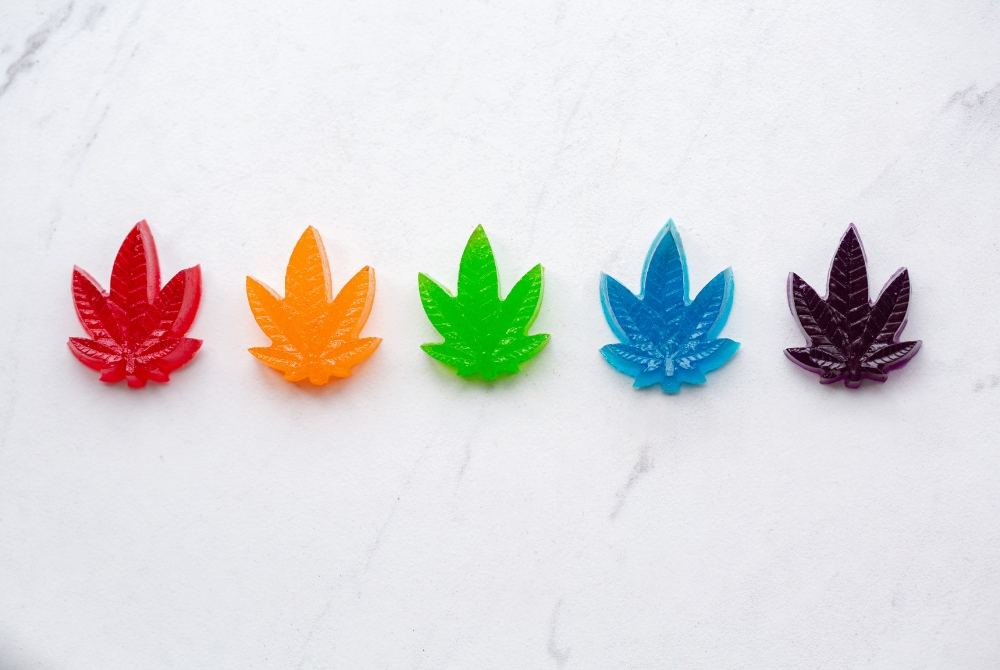We have addressed CBD and cannabis products in recent years on this blog, but the story continues to evolve as more and more states make not only CBD but full THC products legal. Federal legalization remains elusive, but is likely inevitable. In particular, CBD and THC candymakers are following this legal eventuality. What could this legal change mean for the intellectual property assets of cannabis candy businesses? And how can they prepare for it?
State vs. Federal Protections
The biggest conflict in THC-territory right now is the difference between state and federal laws. The USPTO does not allow businesses to register trademarks for products that are illegal. That means, currently, companies making any kind of cannabis product cannot claim federal trademark protection, but they can seek state-level trademark registrations.
Cannabis candy companies fall in the crossfire in two ways:
- They tend to parody familiar brands to attract customers. The jester attitude of brand names like Zkittles and Runtz fits the laidback, funny nature of cannabis culture. However, it also jeopardizes their marks, because the non-cannabis brands being parodied will likely defend their established marks from infringement via dilution.
- Cannabis candy companies in different states may have similar marks registered in their respective states. When cannabis is eventually legalized on a national level, candymakers with too-similar branding may clash over who is able to obtain the federal trademark registration.
The Temptation to Tarnish
In terms of trademark conflict, the risk from larger corporations poses a more imminent threat, although, ideally, one wants to avoid infringement claims from any-sized business. Cannabis candy businesses may be tempted to put a twist on a familiar candy, like Sour Patch Kids, to draw more consumer attention – positive attention, given the fruity, sweet, and sour flavor associations with beloved candies.
But that is exactly why the parent corporations of these candies can successfully claim that cannabis candies are trading on their long-established consumer goodwill. And, because much of the original candy is for kids, they can also claim dilution by tarnishment, as the association with drugs may make parents think twice before letting their kid grab a pack of Skittles.
We see this is in a case brought by Wrigley, the maker of Skittles, against Terphogz, makers of now-defunct Zkittlez. Their mark did not stand up to Wrigley’s lawsuit, and the company has since rebranded as “Z” and stopped using familiar-sounding twists on Skittles slogans like “Taste the Strain Bro.”
So, why do a plethora of cannabis candy companies with parody names still crop up, even if they know their time may be short-lived? Because they are playing a balancing game of profits, time, and conspicuousness.
In other words, consumers are likely to buy these parody candies while they are on the market. But that same consumer fervor will ultimately draw the attention and ire of the “real” candy companies. Often, cannabis candymakers are testing how long they can maintain a profit runway until a lawsuit shuts them down.
How to Avoid Infringement Claims in the Long Run
While the above approach may sound like a fun game, it’s not something to take lightly. Your business could be tanked by legal fees, as larger companies have the resources to see lawsuits through to litigation. As an IP expert, I cannot recommend running a profit runway – then rebranding after you, hopefully, settle before litigation.
A wise catch-all for inter-state trademark conflicts and unwelcome parodies alike is a common caution in IP law: Do your due diligence! It is not financially worth the risk to emulate anyone else’s mark too closely. Hiring an IP lawyer to conduct a thorough state and federal trademark search before you register your own mark is well worth the cost if you plan to play the long game.
